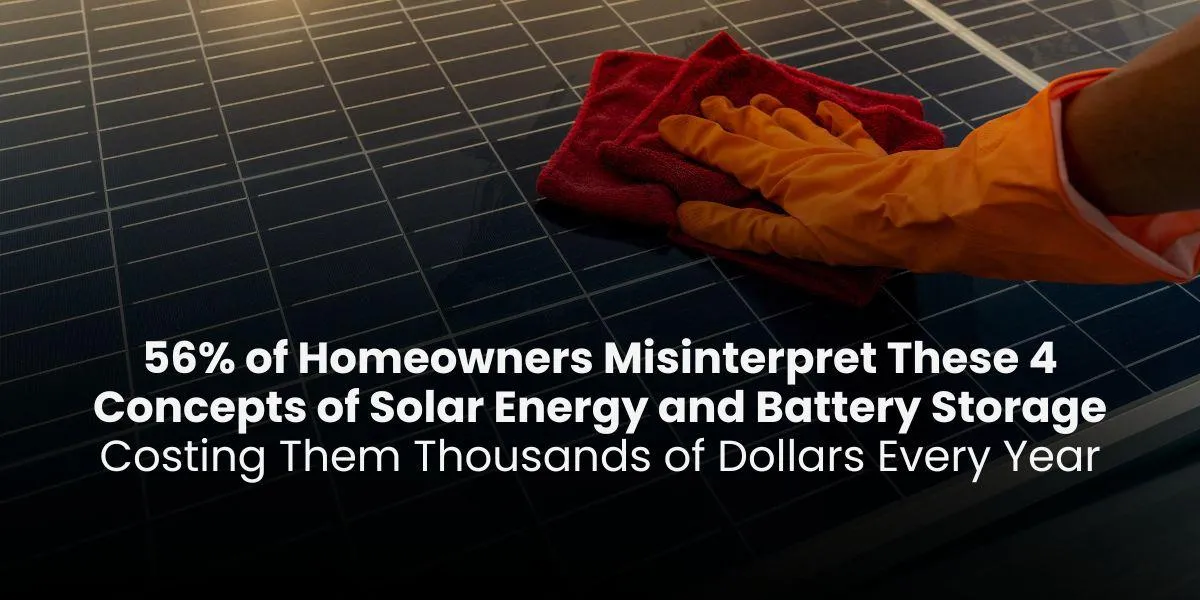Solar Industry
Latest Articles
Transparent Reporting for a Sustainable Future
Read the latest...

56% of Homeowners Misinterpret These Four Concepts of Solar Energy and Battery Storage, Costing Them Thousands of Dollars Every Year
With the growing interest in solar energy, homeowners are increasingly looking for ways to maximize their energy efficiency. However, a recent FranklinWH survey of 1,000 U.S. adults revealed that more than half (56%) of consumers will admit they aren’t familiar with the benefits of residential energy storage.
Many still hold misconceptions about home battery systems. In this article, we’ll clarify four key misunderstandings surrounding home battery storage that solar installers need to address to help homeowners make informed choices.
Understanding Home Energy Storage
What is Home Energy Storage?
Home energy storage systems (HESS) allow homeowners to store excess energy generated by solar panels or sourced from the grid for later use. This stored energy can support power needs during peak hours, outages, or when solar generation is low. Despite their clear benefits, many homeowners hesitate to invest in these systems due to misinformation.
The Importance of Accurate Information
Recent surveys indicate that more than half of consumers are unfamiliar with the advantages of residential energy storage, which can hinder their ability to make well-informed choices about their energy systems. Education is essential for helping homeowners understand these technologies’ full potential and benefits.
Misconception 1: Solar Energy Alone is Sufficient
Thinking Solar Is Enough
A common belief among homeowners is that having a solar panel system eliminates the need for a home battery. This perspective overlooks several critical factors:
Daytime Energy Generation: Solar panels only produce electricity during the day, while many homeowners consume the most energy in the evening.
Utility Interdependence: Those with grid-tied solar systems send excess energy back to the grid. This can be problematic during power outages, as grid-tied systems typically shut down.
Why Batteries Enhance Solar Efficiency
Maximizing Solar Use: Batteries store excess energy generated during the day for nighttime use, effectively maximizing energy efficiency.
Energy Independence: By utilizing a battery storage system, homeowners can access solar energy even during grid outages, leading to enhanced energy security.
Misconception 2: Home Battery Storage Systems Are Only for Backup
Underestimating Their Capabilities
Many homeowners mistakenly assume that the sole purpose of home battery systems is to provide backup power during outages. While this is a valuable function, modern battery systems offer a range of additional benefits:
Smart Management Features: Advanced energy storage technologies can intelligently manage electricity usage, providing both backup and Time-of-Use (TOU) capabilities.
Prioritizing Energy Needs: Systems equipped with load management functions can prioritize essential appliances, ensuring that critical devices remain powered during an outage.
Multiple Functions of Energy Storage Systems
Emergency Power: Batteries allow homeowners to retain essential power during blackouts.
Energy Optimization: These systems help balance energy production and consumption for overall efficiency.
Environmentally Friendly Solutions: They support sustainable living by reducing reliance on fossil fuels.
Misconception 3: Investing in a Battery System Isn’t Worth It
Skepticism Around Return on Investment
A frequently cited concern is whether a battery energy storage system (BESS) is truly worth the investment. Homeowners may perceive these systems as expensive without understanding their financial benefits.
Government Grants Pay For All Solar Equipment & Batteries: The Inflation Reduction Act offers tax credits to homeowners looking to purchase their own solar systems, as well as grants to those who wish to reduce their energy costs through solar and battery storage without the need for cash payments, leases, or loans.
Declining Battery Prices: The cost of battery storage has dropped significantly in recent years, making them much more economical.
Managing Demand Charges: BESS effectively handles peak load charges, helping homeowners minimize costs.
Time-of-Use Savings: Battery systems enable homeowners to store energy when it’s cheaper and use it when costs are higher, allowing for significant savings.
Understanding Financial Benefits
Avoiding High Fees: By managing peak energy use, homeowners can evade hefty charges imposed by utility companies.
Effective Energy Use: Using stored energy during peak hours can drastically reduce electricity bills.
Increased Returns on Solar Investments: In certain regions, stored energy can be sold back to the grid at optimal prices, helping homeowners further recoup their investments.
Misconception 4: Battery Storage Systems Are Risky
Concerns About Safety
There are fears regarding lithium batteries, often stemming from their misuse in older technologies. However, advancements in battery technology have significantly increased safety standards.
Safer Chemistry: Modern home batteries typically utilize Lithium-Iron Phosphate (LFP), which is much safer than older lithium-ion technologies.
Enhanced Thermal Management: Contemporary systems are equipped to avert issues like thermal runaway, addressing significant safety concerns.
Understanding Modern Safety Standards
Robust Designs: Today’s battery systems often include built-in safety features that reduce risks significantly.
Stringent Regulations: Industry regulations ensure that battery systems meet rigorous safety standards, enhancing consumer trust.
The Power of Education: Empowering Consumers
Why Knowledge is Essential
Informing homeowners about these misconceptions can encourage greater adoption of home battery systems. With energy costs on the rise and growing concerns about reliability, understanding the real benefits of energy storage is imperative.
My Solar Solutions is an online brokerage that offers homeowners complimentary consultations to determine whether solar is a suitable option for their homes, along with assistance in comparing quotes from different providers.
Strategies to Communicate Effectively
Personalized Conversations: Installers should tailor their discussions to address individual homeowner needs and motivations.
Accessible Information: Delivering straightforward, clear information about the benefits and safety of these technologies is key to facilitating understanding.
Embracing the Future of Energy Storage
By clarifying these misunderstandings and providing accurate information, we can help homeowners appreciate the true value of home battery systems. As the energy landscape continues to evolve, solar professionals and installers must act as trusted advisors, guiding homeowners toward effective, sustainable energy solutions.
FAQs
1. What advantages does home battery storage provide?
Home battery systems allow significant energy savings, provide backup power during outages, and facilitate efficient energy use by storing solar energy for later use.
2. Are modern batteries safe to use in homes?
Absolutely! Modern battery technologies incorporate advanced safety measures designed to minimize risks compared to older models.
3. Can I still access solar energy during a power outage if I have a battery?
Yes! A home battery system allows you to utilize stored energy from your solar panels, ensuring continued power during outages.
4. How can home batteries impact my electricity bills?
Home batteries enable homeowners to utilize energy during peak pricing periods, which can lead to substantial savings on electricity costs.
5. What kind of return on investment (ROI) can I expect from a home battery system?
ROI can vary depending on individual usage patterns, local utility rates, and energy policies, but many homeowners find that their systems effectively pay for themselves over time through savings.
Showcase Your Product or Service
Sponsorship Package
Bronze Package: Basic Visibility
$1,000 / Month
One Sponsored Article: A featured post on the blog about your brand, product, or service (up to 600 words)
Display Ad on Website: A banner ad (300x250 px) placed on the homepage or specific blog pages for one month
Social Media Mention: One mention on Solar News Today’s social media platforms (Twitter, LinkedIn, Facebook)
Newsletter Inclusion: Your brand included in the monthly Solar News Today newsletter (with a link to your website)
Brand Logo on Website: Small logo inclusion in the "Sponsors" section of Solar News Today

Silver Package: Enhanced Engagement
$2,500 / Month
Two Sponsored Articles: Two blog posts (up to 800 words each) highlighting your brand, services, or industry insights
Premium Display Ad: A large banner ad (728x90 px) placed at the top of the homepage or specific blog posts
Social Media Spotlight: Three mentions (Twitter, LinkedIn, Facebook) featuring your brand or product
Newsletter Feature: A dedicated section in the monthly Solar News Today newsletter with a link to your website
Podcast Interview: A 10-minute interview or feature with your company representative on the Solar News Today podcast
Brand Logo and Link on Website: Prominent placement of your logo and link on the "Sponsors" section of Solar News Today

Gold Package: Premium Partnership
$4,000 / Month
Four Sponsored Articles: Four in-depth blog posts (up to 1,000 words each), covering your company, products, services, or thought leadership in the solar industry.
Exclusive Display Ad: A prime leaderboard banner ad (970x250 px) placed at the top of the homepage and blog pages for maximum exposure
Social Media Campaign: Six posts across Solar News Today’s social media platforms with targeted hashtags, including one video or live session showcasing your company or product
Newsletter Feature + Spotlight: A dedicated section in the monthly Solar News Today newsletter, along with a spotlight feature in a separate email blast sent to subscribers
Podcast Feature: A 20-minute in-depth interview or brand feature on the Solar News Today podcast
Brand Logo and Link on Website: Top-tier placement of your logo and a link on the "Sponsors" section of Solar News Today
Event Promotion: Co-branding on Solar News Today events or webinars (if applicable)
Exclusive Discounts: A limited-time offer or promotion highlighted in all digital content for your product/service


